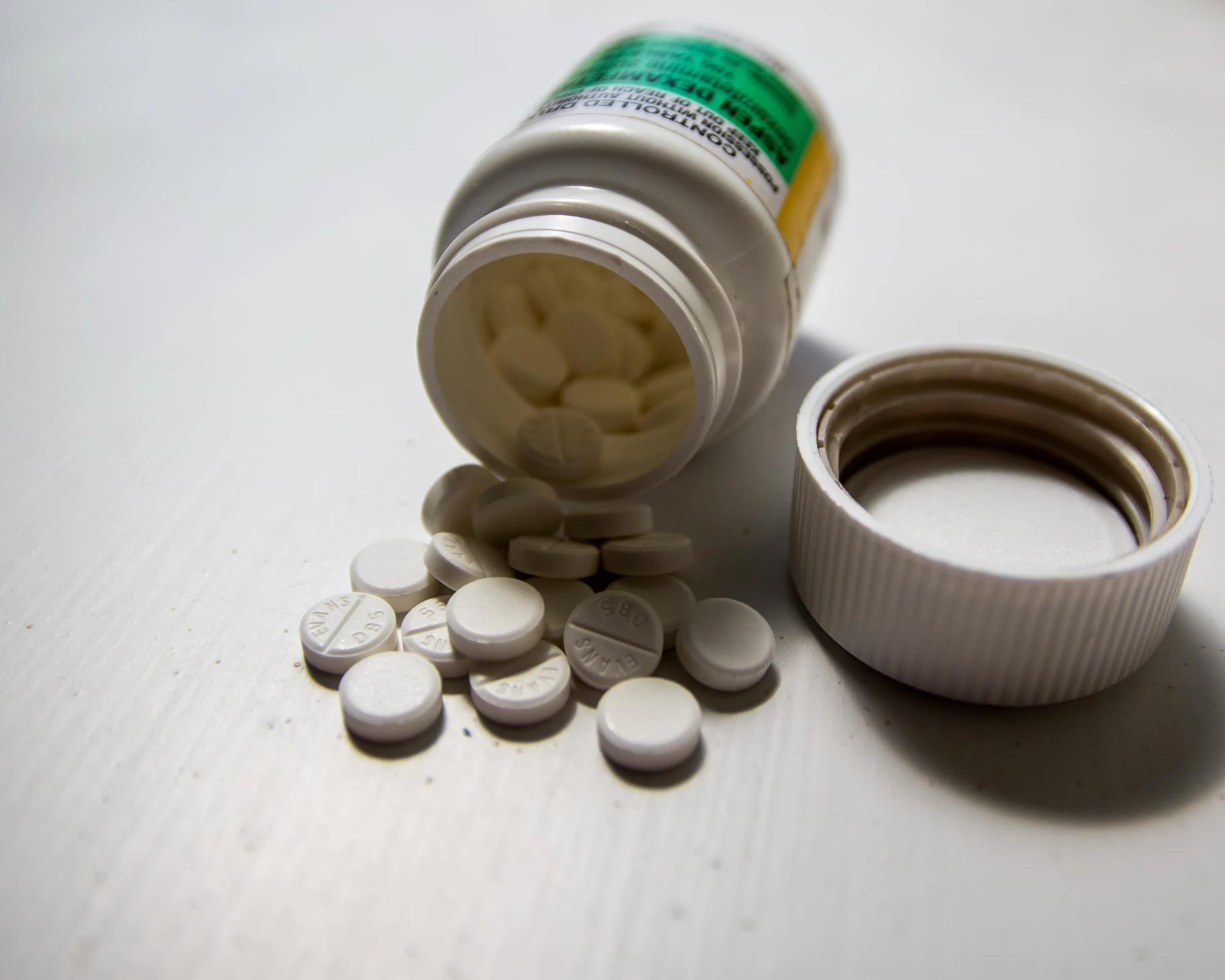The medications listed on this website are provided for informational purposes only.
Their inclusion does not guarantee they will be prescribed to any individual, as treatment decisions are ultimately at the discretion of healthcare providers.
Read moreIn addition to therapy treatment plans, we offer a specialized medication management program. Our comprehensive range of treatment options is thoughtfully designed to provide a holistic solution for managing ADHD effectively and empowering individuals to thrive.
Amphetamines have a high potential for abuse. Administration of amphetamines for prolonged periods of time may lead to drug dependence and must be avoided. Particular attention should be paid to the possibility of subjects obtaining amphetamines for non-therapeutic use or distribution to others, and the drugs should be prescribed or dispensed sparingly. Misuse of amphetamines may cause sudden death and serious cardiovascular adverse events. For more info see the FDA drug label for dextroamphetamine.
Begin Your Personalized ADHD Care Today!

Get your ADHD Prescription Online Today
If you have ADHD, your brain might feel like your laptop: a bajillion tabs open — some for months on end (like the 14 tabs of running shoes you need but can’t decide between). Not to mention the half-written emails (the ones you really don’t want to write), music playing, and some random YouTube videos with the next-up automatically playing. Sound familiar?
If all your thoughts feel like intense, never-ending noise, stopping you from getting anything done and moving forward in life, you might be considering an ADHD medication like ProCentra.
This article breaks down how ProCentra works, including side effects and dosing, and how it’s different from other stimulants. Learn how ADHD Advisor might be able to help you get both an ADHD diagnosis and prescription for medication like ProCentra.
What is ProCentra?
Procentra is the brand name for the drug dextroamphetamine sulfate oral solution. It’s the liquid form of Dexedrine and FDA-approved for narcolepsy and ADHD in children 3+ and adults. It works great for people who can’t swallow pills or need to be precise with dosing.
Procentra is a stimulant, making it a Schedule II controlled substance. Stimulants have a high risk of addiction and misuse, making it accessible only by a clinician’s decision and prescription.
At ADHD Advisor, care is for adults 18+ only — so while ProCentra is technically approved for kids, we focus on supporting adults.
How ProCentra Works
People often describe ProCentra as a quieting of their mental noise. Since it can help you focus on one thing, the background noise can fall away more easily.
It works by stimulating your central nervous system and increasing dopamine and norepinephrine. These neurochemicals are tied to focus, motivation, and impulse control, making them a fit for ADHD struggles.
- Dopamine: Your brain’s “reward and motivation” signal. When it’s low, starting tasks or staying interested in something gets much harder. When higher, it can feel easier to get things done.
- Norepinephrine: Your brain’s “focus and alertness” signal. Low levels can make you feel in a daze, making it hard to pay attention or follow difficult things. Distractions are easily noticeable, so focusing gets even harder. Increasing levels help the distractions seem quieter, allowing you to stay sharp and focus.
Unlike most long-acting medications, ProCentra is an immediate-release (IR) liquid that usually lasts about 4-6 hours. For many people, that means taking more than one dose a day — for example, one in the morning to get through meetings and another in the afternoon to tackle projects without crashing.
Who Can Take ProCentra
ProCentra is FDA-approved for ADHD in children 3+ and adults. However, it’s not recommended for kids under 6 since it can slow developmental growth by causing weight loss.
Who Should Avoid ProCentra
While it’s considered safe for children 6+ and adults, there are certain conditions it won’t work well with:
- Seizures
- Glaucoma
- Severe agitation or anxiety
- Tics or Tourette’s syndrome
- Pregnancy and breastfeeding
- History of drug misuse or dependence
- Circulation problems in fingers and toes
- Heart issues (heart defects, high blood pressure, heart disease, etc.)
- Mental health conditions (bipolar, depression, mania, psychosis, or family history of suicide)
Be sure to tell your doctor everything about your physical and mental health history, including your family’s history, before taking any stimulant.
Dosages and Administration
One of the biggest benefits of ProCentra is that it’s liquid, making dosing easier to adjust (and swallow). Here’s what typical dosing looks like:
- Children 3-5: Starting at 2.5 mg/day.
- Extended-release stimulants are not approved for children under 6 by the FDA. ProCentra is immediate release (IR), however, it still isn’t recommended for children under 6.
- Children 6+: Starting at 5 mg once or twice/day, increasing in 5 mg as needed.
- Adults 18+: Starting at 5-10 mg once or twice/day, max 40 mg/day split into smaller doses.
- ADHD Advisor only prescribes ProCentra for adults 18+ in states that allow online stimulant prescriptions.
Since ProCentra is immediate-release, it wears off in about 4-6 hours. That’s why some people might need to take it more than once per day to manage symptoms. There also isn’t an exact dosage that fits every child or adult, making it important to follow your clinician’s recommendations and report side effects immediately.
Side Effects and Risks
Like every ADHD medication, ProCentra comes with everyday side effects and more serious risks. It’s important to know what to expect so you can spot when something feels “normal” versus a red flag. Here’s what to keep in mind:
- FDA Boxed Dependence Warning: Schedule II stimulants have a high risk of addiction, misuse, overdose — even death when not taken exactly as prescribed.
- Heart Risks: Stimulants can increase your blood pressure and heart rate. While it might feel like too many cups of coffee, it can trigger arrhythmias or sudden death in people with underlying heart conditions.
- Worsened Mental Health: Some people get insomnia, irritability, mood swings, confusion, and even aggression, mania, or psychosis.
- Physical Issues: The most common side effects are digestive issues, loss of appetite or weight, dry mouth, and sleep difficulties. Sweating, dizziness, tremors, are also possible.
- For example, a regular stimulant experience is skipping lunch without realizing it, only to feel shaky, drained, and irritable later on.
If you ever experience serious side effects, you can (and should) report them through FDA MedWatch.
Quick Self-Check Tips
Call your doctor right away if you notice:
- Pounding or irregular heartbeats
- Chest pain or shortness of breath
- Hallucinations or sudden changes in mood
- Extreme weight or appetite loss that doesn’t improve
- Inability to sleep despite adjusting dosage and timing
ProCentra vs. Other ADHD Medications
If you’re comparing ADHD meds, you’ve probably noticed there are a lot of similar-sounding names out there. Here’s how ProCentra stacks up against some of the more common options:
- ProCentra vs. Dexedrine: Both are the same drug, dextroamphetamine, but ProCentra is liquid while Dexedrine is a tablet.
- ProCentra vs. Adderall: Adderall is a mix of different amphetamine salts (like dextroamphetamine and amphetamine), while ProCentra is only dextroamphetamine. Adderall might have a stronger impact on focus, but it can depend on the person. Adderall comes in both IR (4-6 hour effect) and extended-release (10-12 hours) tablets, while ProCentra is IR only. For some, the 10-12 release works better.
- ProCentra vs. Vyvanse: While ProCentra is IR, Vyvanse is long-acting for 12-14 hours. It might be more convenient for people needing all-day-long support.
All in all, ProCentra might be best if you want a fast onset and don’t need the medication to last all day. However, side effects can differ, so how it impacts your body can be the deciding factor.
ADHD Care with ADHD Advisor: Therapy, Non-Stimulants, and Stimulant Availability
Getting ADHD care can feel overwhelming — especially with so many options and state rules to navigate. At ADHD Advisor, we guide you every step of the way.
Step-by-Step Care Process
We break an ADHD diagnosis and treatment plan into clear, manageable steps:
- Take the online intake questionnaire.
- Get tested for ADHD if you haven’t yet been diagnosed.
- Schedule your telehealth diagnostic evaluation with a clinician.
- Get your treatment plan (which may be a combination of therapy and non-stimulants, or stimulants if appropriate).
- If you’re eligible for a stimulant and in a supported state, ADHD Advisor can prescribe ProCentra for adults 18+.
- Schedule your follow-up visits for titration and monitoring.
State Availability Examples
Since stimulants are a controlled substance, online prescriptions aren’t always available. However, we do provide online stimulant prescriptions in Texas and online ADHD prescriptions in Florida.
If you live elsewhere, check your state-specific page to see what’s available where you are. We know it can feel frustrating to navigate state rules, but you won’t be left figuring it out alone — we guide you every step of the way.
Access, Cost, and Insurance
One thing many people don’t realize until they’re at the pharmacy counter: not all ADHD medications are equally easy to find — or afford. Here’s what to keep in mind:
- Brand vs Generic: ProCentra is a brand name for the drug dextroamphetamine sulfate liquid. This drug can also be bought under the generic name, making it cheaper but not always as available.
- Cost and Access Considerations: Liquid stimulants aren’t as common as tablets, so they tend to be on the higher end cost-wise and less available. It could be worth it to call up your local pharmacies and ask if they often have it in stock.
- Insurance Coverage: If a clinician prescribes liquid stimulants, it’s usually for a specific reason (difficulty swallowing, precise dosing, etc.). If you need to get it covered and you use ADHD Advisor, you’ll get a superbill. You can submit it to your insurance company for possible reimbursement since ADHD Advisor doesn’t bill your insurance directly.
2025 FDA Label Update
The FDA requires stimulants like ProCentra to have an expanded label warning for children under 6 because of weight and growth issues.
The FDA recently decided to add extra warnings to stimulant packages since there can be dangerous side effects for users, especially for children under 6. ProCentra now has an expanded label with a warning stating that all stimulants can slow physical growth and cause weight loss in young children.
Stimulants can suppress appetites in both children and adults. However, since children’s bodies are constantly developing, eating less than needed can stunt height and weight over time.
ADHD Advisor only works with adults 18+, so this update is more for parents who are considering stimulants for their child. If they’re under 6 years of age, stimulants aren’t approved by the FDA. However, some health care professionals may prescribe them “off-label” to treat ADHD, so it’s still sometimes up to the parents to decide.
FAQs
Is ProCentra addictive?
Yes. It’s a Schedule II controlled substance, meaning it has a high risk of dependence and misuse.
How long does ProCentra last?
About 4-6 hours per immediate-release (IR) dose.
Can I get ProCentra through ADHD Advisor?
Yes, as long as you’re 18+ and in a state that allows online prescriptions for stimulants. As always, however, it’s up to your clinician to decide if ProCentra is right for you.
What if I miss a dose?
Take the missed dose as soon as you remember, unless it’s within 4 hours of your next scheduled dose. Do not double up and take two within 4 hours.
Who benefits most from ProCentra?
Since it’s liquid, people who have a hard time swallowing pills or need flexible yet precise dosing may benefit most.










